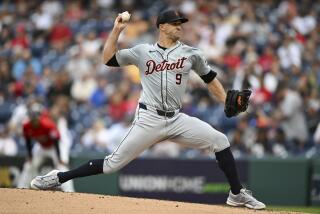BASEBALL / ROSS NEWHAN : It’s a Buyer’s Market With Free-Agent Glut
NEW YORK — Expansion extra:
The draft is over. Rosters have been unfrozen. Baseball moves on to the bigger issue of free agency and one of the overriding questions of the winter:
Will there be a market for the biggest and best free-agent crop ever?
Only time will provide an answer, but respected agent Tom Reich suspects that many will be forced out, many will wish they did what Mel Hall and Glenn Braggs have done: Take that Japanese money and run.
“The clubs have been saying that they couldn’t do anything until the draft was over,” Reich said. “Well, let’s see what happens now.
“I think they’re going to bust the middle class like a grape. It’s a very serious situation out there with the glut on the market.”
Glut? There are more than 150 free agents. The list includes 31 players who became free agents when they were not offered arbitration by their 1992 clubs in the five days immediately after the World Series. Of the 33 players in that category, only Jim Gott of the Dodgers and Tony Phillips of the Detroit Tigers were retained through the offer of arbitration.
It was another indication of the clubs’ abhorrence of that process and their long-range determination to get rid of it. It may also have represented an attempt to further saturate the market in the hope the glut will create a self-adjustment in the salary escalation.
Agent Alan Meersand said he is so suspicious of the climate that he wouldn’t even be surprised to see the “C word” surface again.
He referred to collusion, though it is much too early raise that specter and the owners are committed, through the collective bargaining agreement, to pay treble damages if ever found guilty of it again.
At this point, only one free agent has signed. Andres Galarraga received a modest $600,000 guarantee from the Colorado Rockies. He was a Class-C free agent based on his 1992 statistics, meaning the Rockies will not have to send the St. Louis Cardinals a draft choice as compensation.
Everyone will be looking for those bargains, but who besides the New York Yankees, Atlanta Braves and the two Chicago teams will be out there bidding for players such as Barry Bonds, Ruben Sierra and Mark McGwire?
Marvin Miller, former head of the players union, often said that the smartest thing the owners could do to control salaries was make every player a free agent every year. This winter’s glut is the closest they have gotten to that.
Rosters: Pre-draft speculation was that the Rockies would emphasize younger players, and the Florida Marlins would build a more established team. It was just the opposite.
The average age of Colorado’s 13 first-round picks was 26.5, compared to 24.6 for the Marlins. Seven of the Rockies’ 13 have played two years or more in the majors. Only two of the 13 Marlins have that much experience.
Colorado Manager Don Baylor said he insisted on the best team possible when he interviewed for the job.
“I thought that might work against me, but I felt strongly that we should attempt to do more than just compete in our first year or two,” Baylor said. “The people of Colorado had waited too long for that. We’re going to try to contend.”
Baylor understands the difficulty of that goal.
David Nied, the current ace of his pitching staff, has made two big league starts, which is two more than Jose Martinez, the projected ace of the Florida staff.
Dollar signs: It seems strange that the Angels and Marlins read the same medical reports on Bryan Harvey and came to different conclusions.
It makes one think that the physical issue was camouflage for the Angels’ desire to dump his $10.75-million guarantee--particularly when coupled with the decision to leave Junior Felix, who is eligible for arbitration after making $640,000 in salary and bonuses as the club run-batted-in leader, unprotected into the third round, when the Marlins drafted him.
Since the start of the 1992 season, when they had a payroll of about $33.5 million, the Angels have jettisoned more than $13 million through the departure of Harvey, Felix, Lance Parrish, Hubie Brooks, Von Hayes, Mark Eichhorn and Don Robinson.
Will the savings be used to sign a free-agent hitter? Seems doubtful. This is a club that let Wally Joyner and Dave Winfield leave, was unable to sign Bobby Bonilla, Danny Tartabull or Otis Nixon and may trade Jim Abbott.
There seems to be no question about the Angels’ direction--or where they will finish. The question may be: How long will Whitey Herzog remain, allowing his friendship with Gene Autry to compensate for his frustration with the financial parameters?
Shrewd Braves: Talent-rich Atlanta was expected to take a beating in the draft, but a savvy job of protecting players held the damage to a minimum.
Nied would have competed for a starting job, but shortstop Vinny Castilla and pitcher Armando Reynosa, who were selected in subsequent rounds, didn’t represent significant losses.
“We knew we were going to lose one good player, at least, but we wanted to maintain the integrity of a roster that has won the National League championship two years in a row,” General Manager John Schuerholz said.
The Pirates: Pittsburgh General Manager Ted Simmons insisted that the decision to leave Danny Jackson unprotected into the third round, when he was taken by the Marlins and subsequently traded to the Phillies, had more to do with the organization’s young pitching prospects than payroll.
Perhaps, but the Pirates have nothing to show for trading Steve Buechele. And with Doug Drabek a free agent and Zane Smith coming off shoulder surgery, the projected rotation of Tim Wakefield, Randy Tomlin, Bob Walk, Steve Cooke and Paul Wagner might have trouble producing a fourth consecutive title in the NL East.
Simmons also figures to lose two-thirds of his outfield. Alex Cole was drafted by Colorado, and free agent Bonds is believed headed to Atlanta.
Losers: The Yankees were deemed to have done nothing right. They exposed third baseman Charlie Hayes, thinking that neither expansion team would go the veteran route, only to lose him to the Rockies about 10 minutes into the draft.
At the start of the second round, Florida selected outfielder Carl Everett, a former Yankee No. 1 draft choice who many thought would go in the first round; and the Rockies took catcher Brad Ausmus, a young defensive standout, at the start of the third.
Hayes hit 18 home runs and drove in 66 runs in filling a huge Yankee gap. Hensley (Bam-Bam) Meulens has resurfaced as the third base heir. He hit 26 homers at Columbus last season but struck out 168 times and made 30 errors.
Hot corner: The Yankees’ loss of Hayes complicates the Dodgers’ pursuit of a third baseman, because it puts two teams in what is a limited third base market.
“It’s going to be very difficult to fill that need the way we’d like to, and the Yankees losing Hayes doesn’t make it easier,” said Fred Claire, the Dodgers’ executive vice president.
Claire came out of the draft with a new second baseman, Jody Reed, and his three third basemen of last year, Lenny Harris, Mike Sharperson and Dave Hansen, still in the fold.
“We were competitive in ’91 with Harris and Sharperson alternating, but neither has the power you’d like at that position,” Claire said. “Hansen had quite a bit more playing time last year but didn’t do the things we felt he was capable of.
“They’d be the three competing if we went to spring training tomorrow, but at this point it’s something we want to address and see if it can be improved. Ideally, we’d like a third baseman with power who can play on an everyday basis, but again, it’s not an easy position.”
More to Read
Go beyond the scoreboard
Get the latest on L.A.'s teams in the daily Sports Report newsletter.
You may occasionally receive promotional content from the Los Angeles Times.










